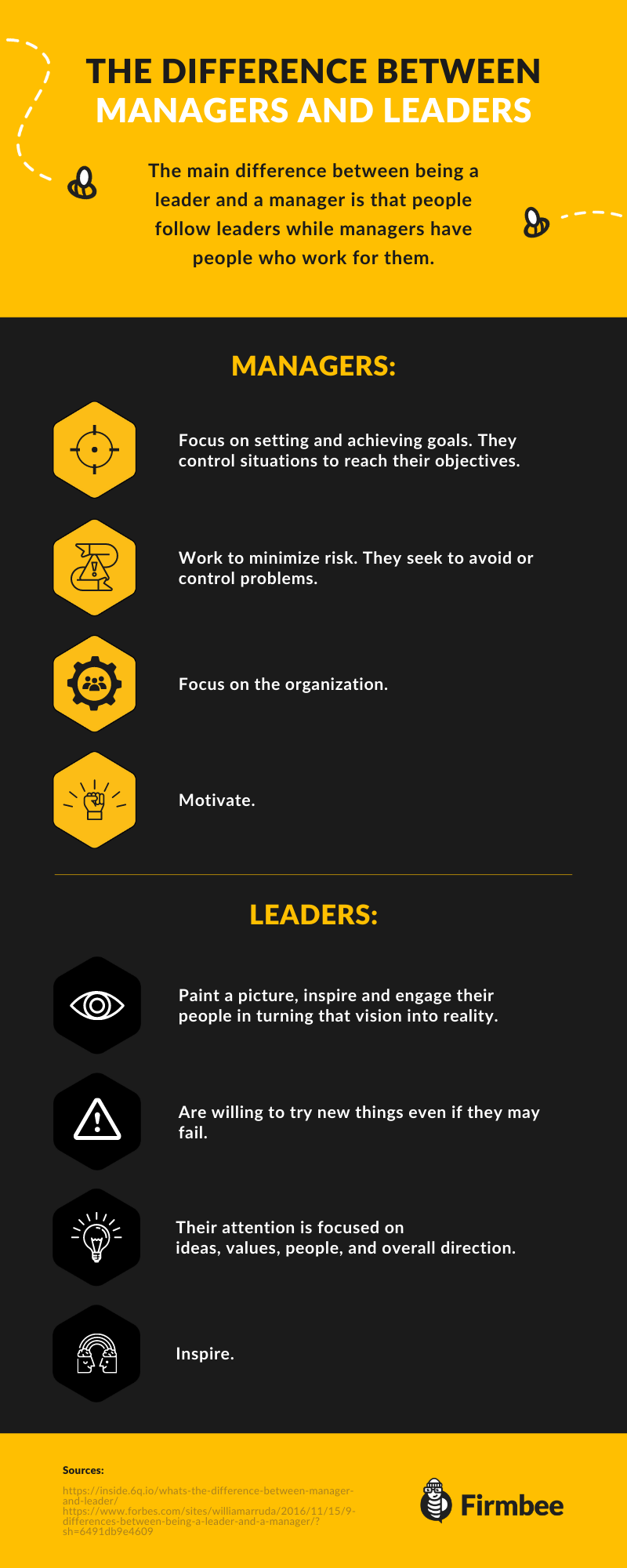In an ever-changing world, what’s better, to be a leader or a manager? This question is still on the minds of supervisors and executives. The difference between these two concepts, though noticeable at first glance, fades to be so when analyzed carefully translating directly into the effectiveness of the organization’s operations. So which strategy fits the current reality better? What is the essence of leadership and management? Is it possible to be a good manager and leader at the same time? Let’s take a closer look.
Leadership versus management – characteristics and examples:
- Leadership versus management – a word of introduction
- Management versus leadership – about the role of a manager
- Leadership vs. management – the role of a leader
- Leader versus manager – differences
Management and leadership – a word of introduction
When discussing management and leadership, the terms vary already on the linguistic level by their connotation, i.e. emotions they convey. The word “manager” brings to mind orderliness, subduedness, and rationality, while the term “leader” connotes inspiration, authority, and courage. Thus, from the very beginning, the leader is seen as the one who focuses on evoking emotions with positive overtones, while the manager is perceived much more neutrally.
Right enough these roles differ from one another, leading to different assumptions, using different means, and realizing different objectives. None of them, however, diminishes the other in terms of importance for the proper functioning of the organization, though we can certainly distinguish stages in which each of them comes to the fore.

Leadership versus management – about the role of a manager
A manager is a person who manages an organization, i.e. plans and organizes its functioning and at the same time motivates to implement such actions and controls the effectiveness of achieving the planned objectives. Although the element of soft skills in the form of motivating to act is present here, analytical, organizational and control skills are definitely in the foreground. The manager more often than not answers the question “why?” with “how?” something should be done. He or she focuses on resources and tools, making sure that the individual cogs in the workings of a company run smoothly. As we know, a good organization is not enough to achieve success. It needs original visions, which allow it to stand out from the competition, but also strengthen the structures from within – convincing the team of the rightness to acts, fusing their values with those of the undertakings’ and – of the fact that it is worth following those who lead them. Therefore, an effective manager does not limit himself only to supervising, but also wants to lead, becoming a symbol of the organization, which the rest can identify and want to follow.
Leadership vs. management – the role of a leader
What do John F. Kennedy, Nelson Mandela, Steve Jobs and Mahatma Gandhi have in common? They all had vision, authority, and became inspirations to millions. These qualities constitute the ideal leader. He or she goes beyond the available patterns, basing his or her actions on informal structures. It is the ideas, values and people that are at the center of his or her focus.
All these elements are part of current trends in management, in the implementation of which actions taken allow not only to dominate the competition with innovative solutions, but also to present something more than just the final product (e.g. ethical production, support for social and environmental actions, cooperation with local producers). The process renders people the feeling of purpose, vision, and values of the organization. Thus making the workforce loyal to the brand, motivated and more effectivent In this sense, a leader’s role in an organization is particularly useful at the stage of determining the direction in which the organization should go (formulating a business plan, introducing a new product, deciding to enter new markets). Also, it comes in handy in crises, when it is necessary to reorganize existing activities, motivate people to overcome difficult situations, or minimize resistance to necessary changes. In such situations, it is the leader who heads people, giving them the strength to face adversity.
Leader versus manager – differences
Given the above, some classification can be made regarding the differences between the roles of leader and manager:
- A manager manages while a leader leads,
- A manager plans and organizes while a leader has the vision,
- A manager operates on a “detail-to-general” basis, focusing on successive, interacting components, while a leader starts from an overall vision,
- A manager stabilizes the organization while a leader drives it,
- A manager seeks to mitigate risk, while a leader’s visions involve risk-taking,
- A manager focuses on plans to implement the strategic steps a leader defines,
- A manager focuses on the organization, while a leader’s attention is focused on ideas, values, people, and overall direction,
- A manager motivates, a leader inspires,
- A manager controls, while a leader drives to action,
- A manager takes structured actions, implemented in stages, while a leader offers revolutionary, leapfrogging solutions,
- A manager subordinates people by acting top-down, while a leader binds them around the values to which they are committed,
- A manager uses formal structures, as opposed to a leader,
- A manager legitimizes his actions with his formal position in the organization, while a leader does so using his authority.
If you’re interested whether you are a better manager or a leader, this interesting quiz might help you allay doubts.
See also: Popular management styles – Lewin-Lipitt-White & Reddin’s approach
Author: Andy Nichols
A problem solver with 5 different degrees and endless reserves of motivation. This makes him a perfect Business Owner & Manager. When searching for employees and partners, openness and curiosity of the world are qualities he values the most.
The most important questions
-
Who is a manager?
A manager is a person who manages an organization, i.e. plans and organizes its functioning and at the same time motivates to implement such actions and controls the effectiveness with which the planned objectives have been achieved.
-
Who is a leader?
A leader is a person with recognized authority within the organization (and often beyond), with innovative ideas, respected values, who unites people around him or her and can lead them.
-
What is the difference between management and leadership?
Management is structured, formal, results-oriented in nature, while leadership involves setting inspiring courses of action that one can identify with and strive for.


















